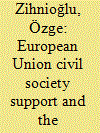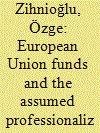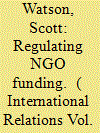| Srl | Item |
| 1 |
ID:
164825


|
|
|
|
|
| Summary/Abstract |
Despite growing critical literature on external funding, the link between EU funding to Turkish civil society organisations (CSOs) and their depoliticisation remains understudied. This article fills this gap. This article explores EU funds in Turkey and shows the incentives it creates for a depoliticised civil society. Drawing on an original set of interviews with 45 CSOs, this article analyses how Turkish CSOs interact with EU funding and how this support impacts on Turkish civil society. This article argues that EU funding’s short-term, activity-based, measurable outcome and visibility-oriented structure contributed to the depoliticisation of those CSOs benefited from EU funds.
|
|
|
|
|
|
|
|
|
|
|
|
|
|
|
|
| 2 |
ID:
169049


|
|
|
|
|
| Summary/Abstract |
The professionalization effect of foreign funding is one of the prominent issues in the critical literature on donor/recipient relations. Despite growing attention on this topic, the link between European Union (EU) funding to Turkish civil society organizations (CSOs) and their professionalization remain understudied. This article fills this gap. Drawing on an original set of interviews with leaders of 45 CSOs in Turkey, this article finds that EU-funded projects have not led to the professionalization of Turkish CSOs. This article suggests several reasons for this and also discusses the broader impact of EU funds in relation to CSO’s professionalization.
|
|
|
|
|
|
|
|
|
|
|
|
|
|
|
|
| 3 |
ID:
073935


|
|
|
|
|
| Publication |
New Haven, Yale University Press, 2006.
|
| Description |
xi, 324p.hbk
|
| Standard Number |
0300110537
|
|
|
|
|
|
|
|
|
|
|
|
Copies: C:1/I:0,R:0,Q:0
Circulation
| Accession# | Call# | Current Location | Status | Policy | Location |
| 051680 | 956.953044/LEV 051680 | Main | On Shelf | General | |
|
|
|
|
| 4 |
ID:
163099


|
|
|
|
|
| Summary/Abstract |
Securitization theory (ST) has succeeded in putting the relation between politics and security at the forefront of research in security studies. Despite this success, little attention has been given to the way states themselves produce the boundaries of legitimate political activity, particularly in relation to the boundaries between civil society and the state and between the foreign and domestic. This article is concerned with how states see the boundary between the political and the non-political as a matter of security. It investigates this question by examining the international and national efforts to restrict the financing of non-governmental organizations (NGOs) and civil society actors. It demonstrates that these entities are deemed threatening to the established boundaries of legitimate political activity and thus subject to harassment, increased regulation, and eradication. This is done by the depiction of their activities as political, rather than humanitarian/cultural/social, demonstrating that the concepts of politics operative in the ST literature are already delimited through processes of securitization and depoliticization. Continued research into the relation between politics and security must therefore consider the ways that the political itself is securitized.
|
|
|
|
|
|
|
|
|
|
|
|
|
|
|
|
| 5 |
ID:
157928


|
|
|
| 6 |
ID:
170311


|
|
|
|
|
| Summary/Abstract |
The global governance literature is increasingly concerned with questions regarding the purpose of global governance and the sources of power in world politics. One strand of this debate centers on nongovernmental organizations and to what extent their role in global politics and policy processes is legitimate. This article uses Greenpeace India as an instructive case study to analyze the legitimacy problems facing international nongovernmental organizations (INGO s) campaigning on a global policy platform in the context of domestic politics. The article argues that the undertheorization of INGO s’ agency as global actors is likely to reproduce processes of structural delegitimation that maintain a discrepancy between two of their legitimacy constructs. This is exemplified in questions about their representativeness and restrictive regulatory frameworks that undermine their legality. This article proposes that developing a more nuanced empirical understanding of the endogenous and exogenous limits of INGO s’ power can help bridge the theoretical gap between their global and local agencies.
|
|
|
|
|
|
|
|
|
|
|
|
|
|
|
|